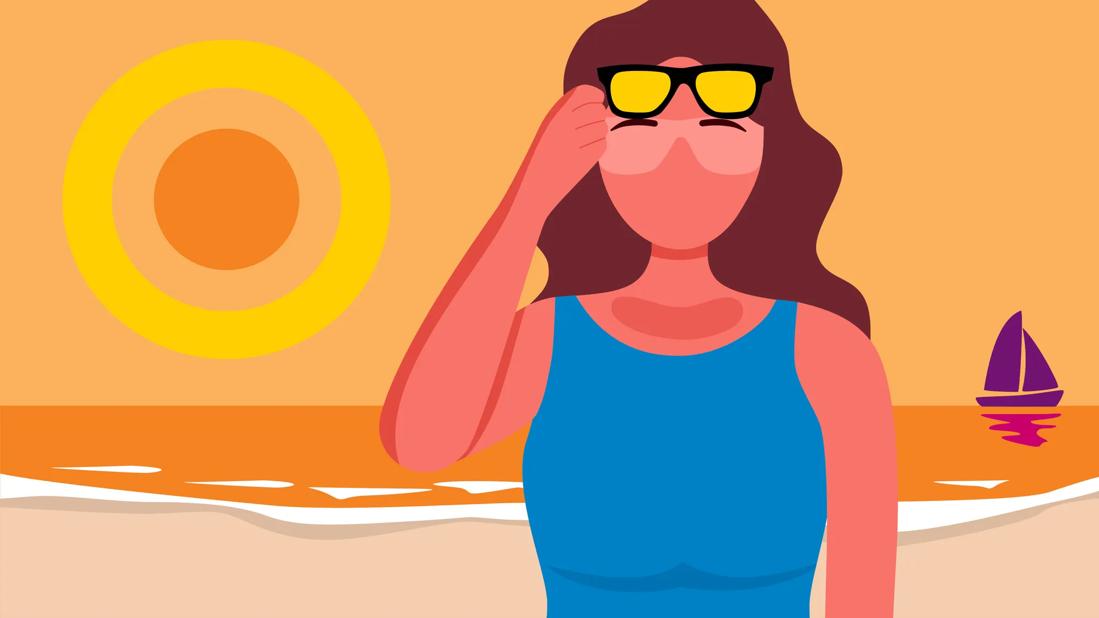A sunburn will leave you itchy and red, while sun poisoning can feel like an allergic reaction

Image content: This image is available to view online.
View image online (https://assets.clevelandclinic.org/transform/3e8ba4c5-654f-4970-9037-7cddc214b950/sun-poison-burn-1404782970)
Person on the beach in the sun, sun burnt
A sunny day is usually an invitation to get some fresh air, enjoy the beach and, of course, enjoy the sunshine. But many of us have had those times when the sun hits us a little too hard and we wonder: Is this just another sunburn or could it be sun poisoning?
Advertisement
Cleveland Clinic is a non-profit academic medical center. Advertising on our site helps support our mission. We do not endorse non-Cleveland Clinic products or services. Policy
As both are often partners in crime during the hot summer months, family medicine doctor Matthew Goldman, MD, discusses sunburn vs. sun poisoning — and how to find relief from both.
Sunburns typically go away after a few days. If you’re experiencing the following symptoms (and they subside after a couple of days), you may have a sunburn:
Though sun poisoning isn’t a medically defined condition, it’s essentially a severe sunburn. It lasts longer than a typical sunburn and the symptoms are more serious. The following symptoms are common signs of sun poisoning:
This is why you may have heard people describe sun poisoning as more of an allergic reaction or “sickness” rather than just a burn.
“While both a sunburn and sun poisoning can cause your skin to become red, painful and swollen, sun poisoning will give you additional symptoms that go deeper than the skin,” explains Dr. Goldman. “Although sun poisoning can resemble an allergic response, it’s typically due to intense UV exposure and not a true allergy.”
Advertisement
A sunburn can go hand-in-hand with sun poisoning — and so can their treatments. Depending on severity, you can treat your sunburn and a mild case of sun poisoning at home. To find relief from both a sunburn and sun poisoning:
In general, after a few days, if you’re still feeling extreme, burning pain, as well as widespread blistering on your skin despite at-home treatments, you should seek medical attention.
Although mild sun poisoning can be treated and relieved at home, there are some cases where you should go to the emergency room. If you experience any of the accompanying symptoms or signs of heatstroke, you should go to the emergency room or see your healthcare provider:
Once admitted, you may need to receive intravenous (IV) fluids or be treated at the burn unit.
The discomforts of sunburn — like redness and itchiness — can be an inconvenience. But they’ll heal with time and over-the-counter treatments. More severe symptoms of sun poisoning — such as nausea, dizziness and blistering — may require a visit to a healthcare provider.
Either way, precaution is the best prevention.
“Each time you head outside, make sure you apply and reapply sunscreen that is SPF 30 or higher,” stresses Dr. Goldman. “You also want to limit your time in the sun, stay hydrated and wear sun-protective clothing and hats.”
Advertisement
Advertisement

Sign up for our Health Essentials emails for expert guidance on nutrition, fitness, sleep, skin care and more.
Learn more about our editorial process.
Advertisement
Several conditions, like vitiligo and fungal infection, can cause a loss of pigmentation, leading to white spots or patches on your skin
This cooling gel can help soothe sunburned skin, but it can’t cure the burn
You know it’s not good if you’ve been holding onto it for more than three years or if it’s changed in color, consistency or smell
Look for a UPF rating of 50+ for optimal protection against UV rays
A cool shower, aloe vera gel, anti-itch treatments and cool compresses can provide fast sunburn relief
SPF stands for ‘sun protection factor’ — it’s a measure of how much protection you’re getting before a sunburn is possible
This ‘poisoning’ is actually a severe sunburn that seems similar to an allergic reaction
When outside, protect your skin from damaging UV rays with a fresh layer of sunscreen at least once every two hours
Prioritize your health by managing stress, strengthening your social connections and getting quality sleep
Bolsters, blankets, pillows and blocks can offer extra support, stability and comfort
Allergies, postnasal drip, asthma or reflux could be to blame for a cough that won’t quit